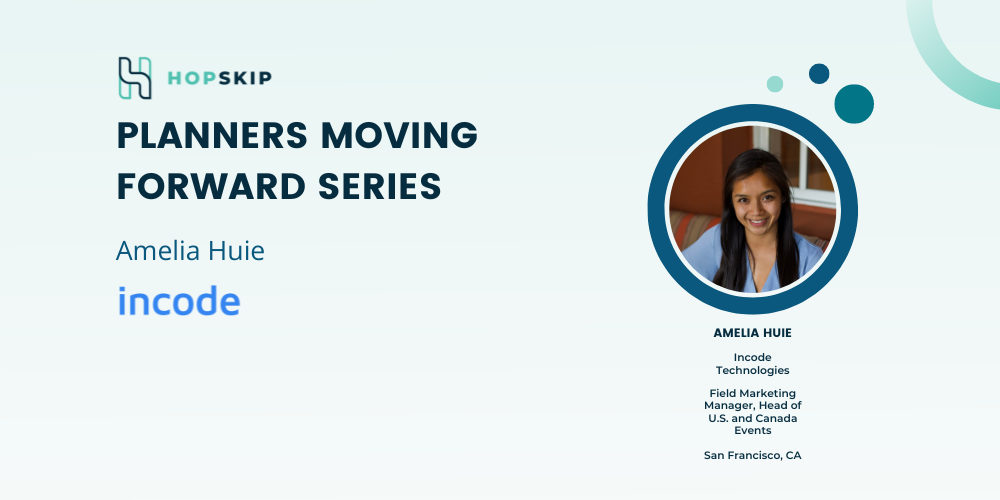This post is part of the HopSkip Planner Spotlight Series where HopSkip spotlight's planners across the industry to bring awareness of how they adapted to COVID-19, communicating and lessons learned and sharing how they are viewing the meetings and events industry in a post-pandemic world.
Name: Amelia Huie
Company Name: Incode Technologies
Job Title: Field Marketing Manager, Head of U.S. and Canada Events
Years of Experience: 5+
How do you think you are positioned, after months of persevering with the pandemic, to take advantage of our new and disrupted meetings/events landscape?
To be honest, I feel like we are working at the will of the supply chain issues. I think the pandemic shifted the industry to go virtual which is great in theory and at the time, but now with going onto our 3rd year of virtual events, people have a strong desire to meet in real life (IRL). The post-pandemic world now struggles with staffing, getting shipments on time, and more. Therefore, event professionals are on their toes even more so than before.
As our community moves forward with planning in-person meetings, what new technologies or processes are you implementing that you may have not looked at before?
In regards to what we utilize right now; there really hasn't been any new tech that we've taken on. It would be great if there was a central forum/software that kept up with COVID restrictions for events in each state/region as well as a legal-approved way to know vaccination status due to travel needs from employees.
As we see virtual meetings transition back to face to face, hybrid meetings are beginning to be the vehicle to return to normalcy. What are your thoughts on hybrid meetings versus traditional fully in-person meetings?
Hybrid meetings are the great middle ground for events transitioning back to "normal". It allows the freedom and flexibility for the attendees to participate in the event in whatever way makes them comfortable.
In your opinion, what do you think the biggest value for your attendees is in regards to returning to live events?
Making strong personal connections where you are able to give handshakes and hugs. I also think it's easier to "read the room" and read someone's body language better in person as well.
As the pandemic fades away and we return to face-to-face events what do you hope changes, either for planners or hoteliers, in the traditional RFP and proposal process as a result of all of the learnings from the last 20+ months?
I think the key thing to remember is that we are all on the same side and trying to execute flawless event. The likelihood of someone trying to sabotage your event is slim to none and everyone is doing the best they can with the resources (or lack there of) they have. Overall the response rates have been longer which can be due to staffing, but at that point I just pick up the phone and call because it's easier to work with a voice. We are all human after all, let's try to remember that and give each other grace.
This post is part of the HopSkip Planner Spotlight Series where HopSkip spotlight's planners across the industry to bring awareness of how they adapted to COVID-19, communicating and lessons learned and sharing how they are viewing the meetings and events industry in a post-pandemic world.
